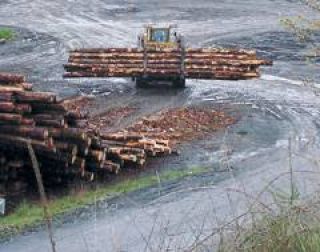By Kevin Hanson, The Courier-Herald
"The mill" - whether known as the White River Lumber Company or, later, Weyerhaeuser - was part of the Enumclaw scene for more than a century.
That came to an end last week, as the final logs were shuttled through the mill and employees worked their final shifts.
The log yard is now emptied, buildings are slated for demolition and workers have scattered - some to other jobs, some to retraining opportunities and some to the unemployment line.
The end certainly wasn't a surprise, as Weyerhaeuser had announced in October it would be closing its Enumclaw mill and selling thousands of acres of timberland. Employees had been laid off along the way, and the final regular crews polished off the last of the logs last week.
Some employees will remain to help with the clean-up effort. And then comes the demolition - the mill office, truck shop and storeroom will be spared, but everything else will be taken down.
Despite the solemnity surrounding the mill's final days, none can doubt the long and colorful history the mill has enjoyed, and the important role it played in the development of the community.
Never to be forgotten
The company has gone through a few transformations, particularly during its early years, but has been part of the Plateau picture since the 1890s. Along the way, the mill shaped the development of the Enumclaw community and, on occasion, reflected national trends. During its early history, the mill was known as a "Swede company," owing to the large number of Scandinavians in ownership roles or otherwise on the payroll. During World War II, the company went to double shifts to meet demands of the war effort; women joined the company ranks to fill jobs previously held by men who were suddenly in the military; and a sizable community of Japanese mill workers disappeared, shuttled off to internment camps, never to return.
For almost 40 years, a dominant Enumclaw feature was the three-mile-long, V-shaped flume that carried lumber from the sawmill east of town to the downtown planning mill. Old-timers can recall adventuresome kids riding makeshift rafts down the flume, until a company foreman would put an end to their fun.
It was in the late 1920s that the White River Lumber Company began merging operations with the Weyerhaeuser Company. Finally, in 1949, Weyerhaeuser completed a purchase of the Enumclaw-based sawmill.
The company enjoyed its boom times, when timber was as plentiful as the demand. The local mill enjoyed technological upgrades and eventually was able to crank out enough product to build a small town - nearly on a weekly basis. Employees last week were estimating that, in its prime, the mill produced about 5.5 million board feet per week, enough to build slightly more than 700 average homes.
In recent times, employees had heard rumblings and knew plant closure was a possibility, ever since the downfall of the Asian economy. The local plant was expensive to run, but the financial return had been great, keeping things humming along. But, when the overseas customer base dried up, financial problems came along and, eventually, the decision was made to close the doors for good.


